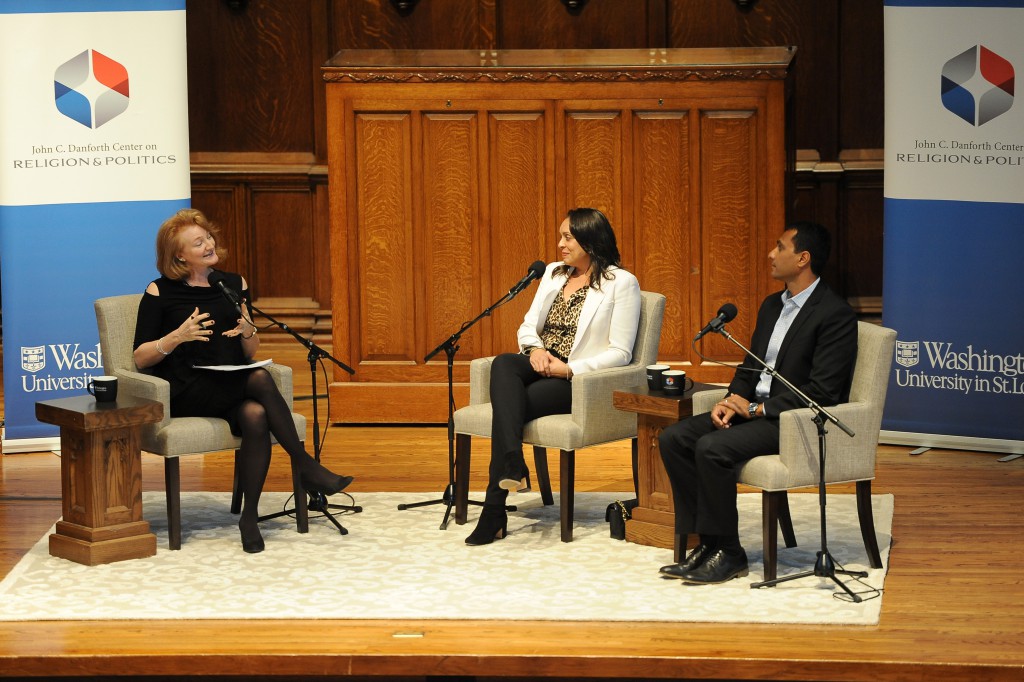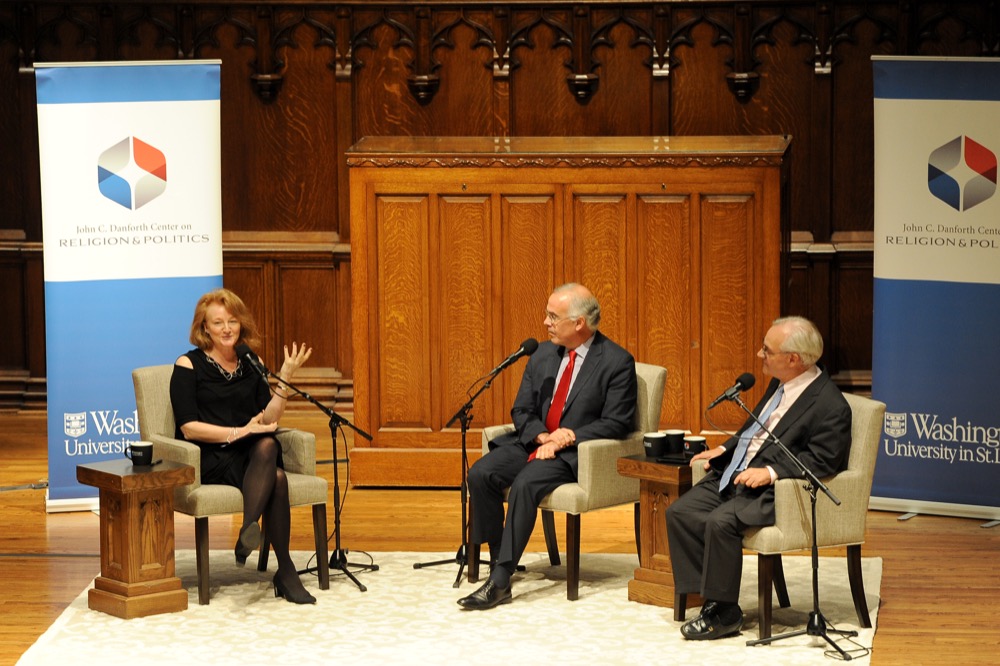Campus Events
Danforth Dialogues leads to discussion of politics, religion
Two panel discussions—one on religion and the common good and the other on religion and national politics—were held at Graham Chapel this Saturday to accompany Sunday’s presidential debate.
The Danforth Dialogues discussion filled the chapel to capacity, and featured Eboo Patel, the founder of Interfaith Youth Core and a member of President Barack Obama’s Inaugural Faith Council; Natasha Trethewey, a Pulitzer Prize winning poet and a two-term U.S. Poet Laureate; David Brooks, New York Times columnist and “PBS NewsHour” analyst; and E.J. Dionne, Washington Post columnist and NPR commentator.

Krista Tippett begins Danforth Dialogues: Envisioning The Future Of Religion And Politics In America by engaging with Eboo Patel and Natasha Trethewey on “Religion and Conceptions of the Common Good.” The free ticketed event was held in Graham Chapel on Saturday, Oct. 8, 2016.
Patel and Trethewey participated in the first discussion on religion and the common good, while Brooks and Dionne participated in the second discussion on religion and national politics. Both sessions were moderated by Krista Tippett, a Peabody Award-winning “On Being” radio show and podcast host.
The first session centered around the ideas of empathy and justice, with both Patel and Trethewey noting the necessity of understanding. The two stressed acknowledging that others might come from places where ideas differ from your own.
Patel described a narrative he felt applied to Republican presidential candidate Donald Trump’s supporters, saying he recognized why these voters might feel dissatisfied with their circumstances, even if many of them hold opinions he doesn’t agree with personally.
“I, up until 18 months ago, had not considered that circumstance [of the white, lower-class voter Trump appeals to],” Patel said.
Trethewey agreed that we have to listen to the perspectives of others, but added that some groups might feel disenfranchised because other minority groups have gained more rights.
“I think about the people who are frustrated about where opportunities, where their lives are going, what seems to have been lost is that we’re a nation where, for the longest time being in a position to have things meant keeping other people from having it. And that’s the sad thing about it…is that people feel like they’re losing something, when their losing means other people gaining opportunities,” Trethewey said.
Patel acknowledged human tendency to feel as though others who have different perspectives from your own are wrong and noted his efforts to overcome that.
“That is the way I viewed the world at one point—was that I am the smart one, and you are the dumb one [if you don’t agree],” Patel said. “The more empathy one has and the more diversity one is in, the more one understands different definitions of justice.”
Patel and Trethewey’s discussion ended on a positive note, with each saying that the world has become a more empathetic place than it once was and with each expressing hope for the future.
Brooks’ and Dionne’s conversation focused on politics and religion. Dionne, a Democrat, noted that he’s found Trump’s campaign particularly offensive, in part because he feels the candidate lacks many moral characteristics.
“I’ve never seen a campaign that I’ve wanted to end so badly as Trump’s,” Dionne said. “I’ve never felt like that in my entire life.”

Krista Tippett begins the second conversation of Danforth Dialogues: Envisioning The Future Of Religion And Politics In America by engaging with David Brooks and E.J. Dionne Jr. on “Religion and National Politics.” The free ticketed event was held in Graham Chapel on Saturday, Oct. 8, 2016.
Dionne and Brooks agreed that younger people are as a whole less religious than older people. Still, Brooks argued that the loss of the American dream—rather than the decrease in religious followership—is cause for problems regarding morality within our nation.
“We often walk in shoes that are too small for us, and I think what’s been lost in this country is the American ideal,” Brooks said.
Brooks is the author of “The Road to Character,” a book focused on morality and theology. He argues that by reconsidering the idea of sin, we can embrace more positivity.
“We all know some loves are higher than others; our love of truth should be higher than our love of money,” Brooks said. “It’s easier to swallow the concept of two positive things that are out of order, and that’s how we introduce the concept of sin. A lot of what we have to do is reintroduce the concepts.”
